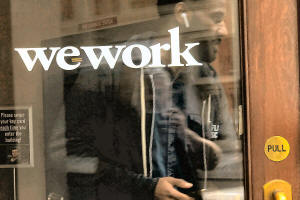WeWork agrees $9 billion SPAC merger to finally get stock market listing
 Send a link to a friend
Send a link to a friend
 [March 27, 2021] By
Niket Nishant, Noor Zainab Hussain and Joshua Franklin [March 27, 2021] By
Niket Nishant, Noor Zainab Hussain and Joshua Franklin
(Reuters) - WeWork said on Friday it has
agreed to go public through a merger with blank-check firm BowX
Acquisition Corp, enabling the office-sharing company to complete a
stock market listing two years after its failed first attempt.
The merger with BowX, a special purpose acquisition company (SPAC),
values WeWork at around $9 billion, a steep drop from the $47 billion
the money-losing company was worth in a 2019 private funding round led
by Japanese conglomerate SoftBank Group Corp.
Later in 2019, WeWork attempted an initial public offering but pulled
the plans due to investor concerns over its business model and
co-founder Adam Neumann's management style.
Neumann ultimately stepped down as chief executive. Sandeep Mathrani is
now CEO, and his work has included cutting costs by $1.6 billion,
according to WeWork.

"Sometimes you don't pick the path (and) a path picks you. In December,
we were approached by BowX and other SPACS," Mathrani told CNBC in an
interview.
"We had seen a path to profitability and we thought it was a good time
to raise additional liquidity to de-risk the balance sheet, and to make
sure that we have a path to profitability," Mathrani added.
BowX shares on Nasdaq were up 8% in morning trading.
SoftBank, WeWork's largest backer, will retain a majority stake in the
company after the deal. SoftBank and other investors have agreed to a
one-year lock-up on their shares, according to a person familiar with
the matter. Current shareholders will own about 83% of the combined
company.
SPACs like BowX are shell companies that raise funds in an IPO with the
goal of merging with an unidentified private company. For the company
being acquired, the merger is an alternative way to go public over a
traditional IPO.
[to top of second column] |

A man walks out of a WeWork space in the Manhattan borough of New
York City, New York, U.S., October 4, 2019. REUTERS/Carlo Allegri

'OPPORTUNITY STOCK'
Prospective investors in WeWork's 2019 IPO were in part spooked by
losses that stretched into the billions of dollars with no clear path to
profitability.
WeWork has yet to turn a profit. Its adjusted EBITDA, a measure of a
business' underlying profitability, was -$1.8 billion in 2020. WeWork
forecasts this will be -$900 million in 2021 but predicts it will
achieve operating profitability of $500 million in 2022.
WeWork has also had to weather the COVID-19 pandemic, which led to many
office staffers working from home. WeWork's revenues for 2020 were flat
at $3.2 billion, but the company and real estate industry experts expect
there will be growing demand after the pandemic for the sort of flexible
offices provided by companies like WeWork.
"We believe that WeWork is going to be the opportunity stock for the
recovery," BowX co-CEO Vivek Ranadivé told CNBC.
In total WeWork expects to raise $1.3 billion in cash from the merger,
funded by the $420 million BowX raised in its IPO in August and an $800
billion private investment in public equity (PIPE) from investors
including Insight Partners, Starwood Capital Group and Fidelity
Management.
BowX had initially looked to raise $500 million for the PIPE but
increased this due to investor demand, according to people familiar with
the matter.
PJT Partners was WeWork's financial adviser on the deal. UBS Group AG
advised BowX.
(Reporting by Niket Nishant and Noor Zainab Hussain in Bengaluru and
Joshua Franklin in Boston; Additional reporting by Herb Lash in New
York; Editing by Ramakrishnan M., Arun Koyyur, Saumyadeb Chakrabarty and
Dan Grebler)
[© 2021 Thomson Reuters. All rights
reserved.] Copyright 2021 Reuters. All rights reserved. This material may not be published,
broadcast, rewritten or redistributed.
Thompson Reuters is solely responsible for this content. |